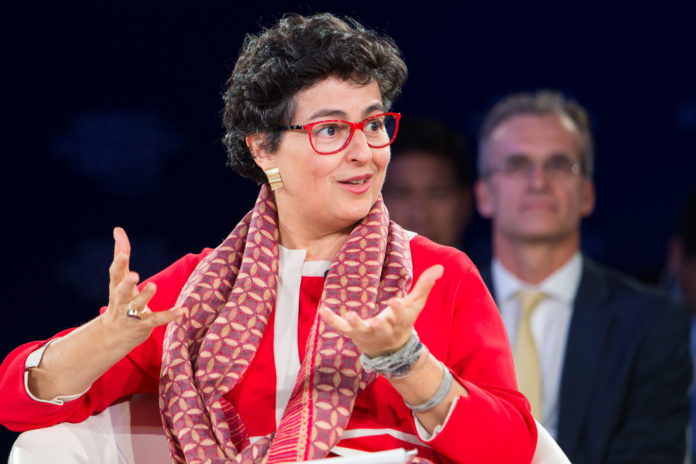1 trillion per year would have a major impact on achieving the Sustainable Development Goals, while generating profits for investors
According to the 2019 edition of the SME Competitiveness Outlook, the lack of scalable investment projects in SMEs, and of knowledge about business capabilities, as well as difficulties in connecting SMEs and investors, prevent the latter from channeling more of the funding that would otherwise benefit them towards investment opportunities in developing countries. The International Trade Hub's Executive Director, Arancha Gonzalez, shares her analysis.
The United Nations' Sustainable Development Goals (SDGs) remain fundamental to realizing the world we all want by 2030. One of the essential components of these SDGs is their financing - but for many of us, the world of international high finance is a difficult one to understand, and difficult to navigate. This is partly due to its sheer size.
Asset managers manage tens of trillions of dollars worldwide. Hundreds of billions of dollars are traded daily on stock markets. Another obstacle is the impenetrable language used by these experts, and yet another is the distance between the world of international high finance and the day-to-day lives of most individuals and businesses.
The work of the International Trade Centre (ITC) often touches on the world of finance - or, more precisely, the world "in default of finance". It's not unusual for the small and medium-sized enterprises (SMEs) we work with to have difficulty meeting a large order, simply because they can't borrow a few thousand dollars to invest and increase production. We frequently work with start-ups who have excellent business ideas, yet struggle to find the financing required to turn these ideas into reality. For each of these companies that fails to secure the financing it needs, it's a lost opportunity to contribute to the SDGs.
In fact, SMEs have enormous potential to have an impact on the SDGs, through the jobs they generate, the business practices they choose to adopt (e.g. sustainable and environmentally-friendly production processes), the sectors in which they operate (e.g. increased agricultural production helping to reduce world hunger), not to mention their impact on innovation and economic diversification. Our analysis suggests that SMEs can have a 60% positive impact on each of the SDG targets.
The United Nations Financing for Development program aims to strengthen synergies between public and private finance, in order to benefit the MDGs. SME financing is therefore an essential component of development financing, which aims to "leave no one behind".
This report demonstrates that providing more finance to SMEs in developing countries would pay unparalleled dividends in terms of progress towards the SDGs, while delivering solid returns to investors.
The first expectation of a potential investor is a reasonable return on investment. While some SDG-related investments yield only social progress, there are also private sector development projects that offer opportunities to deliver both social progress and financial returns. The developing world is teeming with SMEs with commercially viable business ideas. One estimate of the SME financing market puts it at $5.2 trillion.
Yet investors generally regard SMEs as risky investments, and even more so in the developing world. They perceive the macro environment as precarious, and investment processes as non-transparent and unpredictable. What's more, the weaknesses of the relevant financial intermediaries in most developing countries translate into a lack of market intelligence provided to international investors, preventing them from identifying promising opportunities and correctly assessing risks.
In this report, we aim to demystify and unravel what it takes to bridge the gap between the world of international high finance and that of SMEs on the ground. We also describe what governments and multilateral agencies can do to reduce the information gap between foreign investors and local small and medium-sized enterprises.
Local financial intermediaries - referred to in this report as "investment facilitators" - are essential for linking international high finance and SMEs in developing countries. The stronger these facilitators are, the easier it will be for foreign investors to assess the risks and opportunities of investing in local SMEs. This will come as no surprise to financial specialists in the developing community, who have long lamented the weaknesses of the developing world's financial systems.
Investing in stronger financial intermediaries, such as gas pedals, investment promotion agencies, or local financial institutions could have multiplier effects.
According to our calculations, generating an additional $1 trillion annually in private investment for SMEs would have a major impact on achieving the SDGs. This is a realistic order of magnitude for the international high finance community, and would be equivalent to reducing the financial backwardness of SMEs in the developing world by a fifth.
At ITC, we've always worked with and through local partners to reach SMEs. Our partners, or multipliers as we call them, include promotion agencies, chambers of commerce and sector associations. As export-ready companies are also generally investment-ready, we increasingly work with local gas pedals and investment promotion agencies. By strengthening these partners and their networks through knowledge of local SMEs, we are helping to make trade and investment a reality.
Working through local facilitators is effective and enables national ownership. This is the best mechanism for scaling up, making the slogan "Sound finance for small businesses" a reality, and above all making a tangible contribution to achieving the SDGs.


